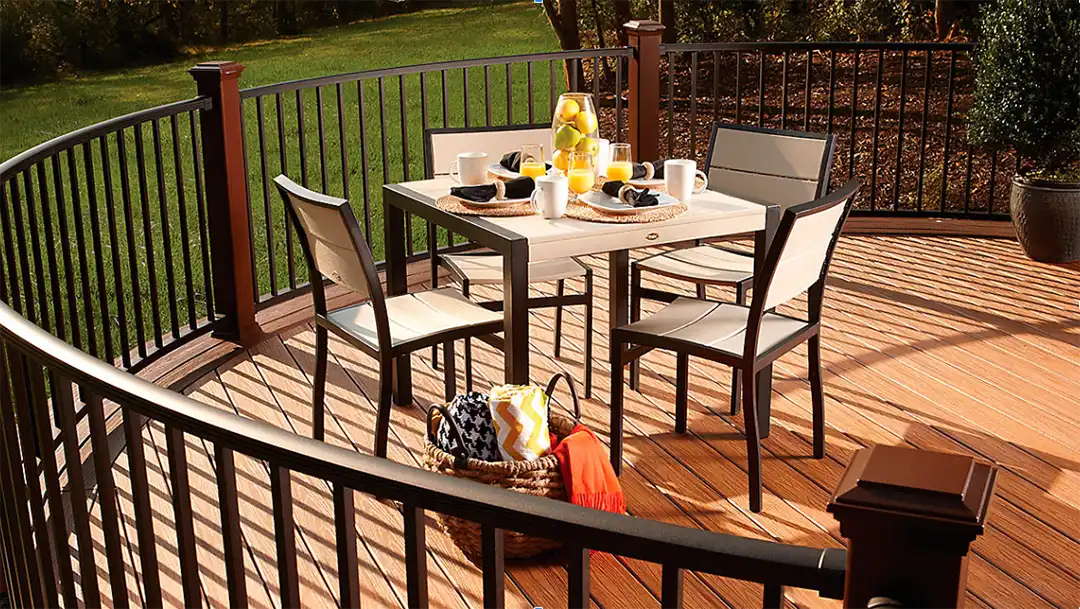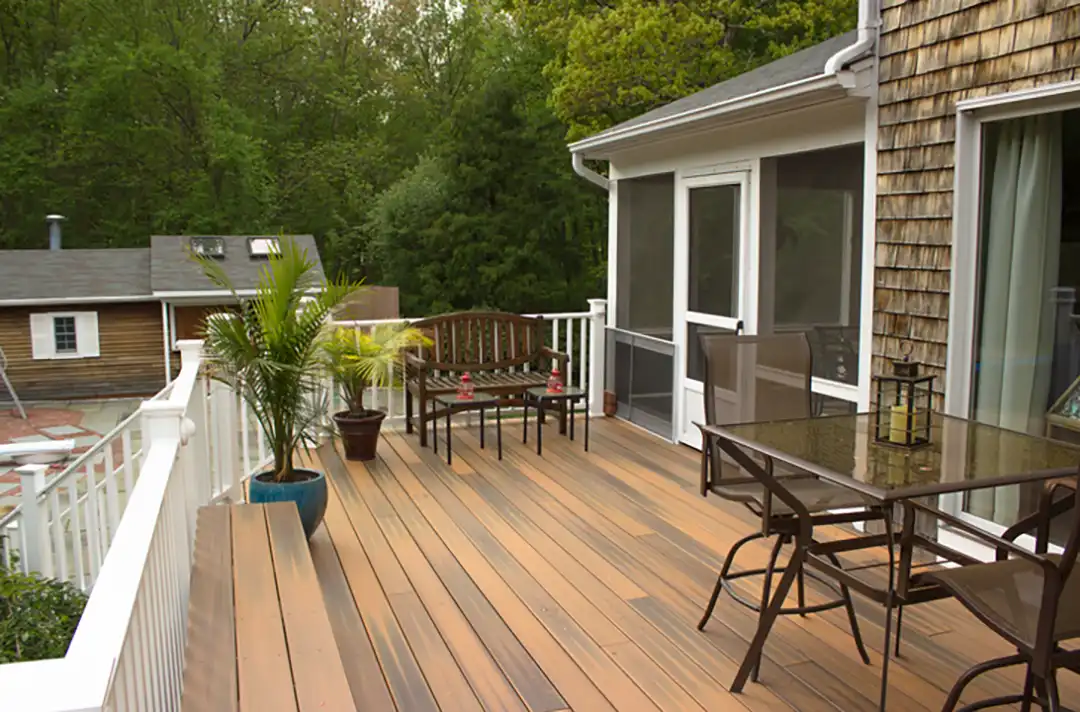Premier Composite Decks Builder in Mentor, OH
Composite decking has revolutionized the decking industry, offering a perfect blend of beauty, durability, and low maintenance. Whether you’re looking to create a serene backyard retreat, a durable family-friendly deck, or a sophisticated entertainment area, we can design a composite deck to meet your unique personal preferences and style.
Our expert team is dedicated to transforming your vision into reality with high-quality composite materials, ensuring that your deck not only looks fantastic but also stands the test of time. Explore our range of services to discover how composite decking can enhance your home’s value and your outdoor living experience.
What are Composite Decks
Composite decks are a popular choice for homeowners who want to enhance the beauty and functionality of their outdoor space. These decks are made from a combination of recycled materials, such as wood fibers and plastic, which are then molded into composite deck boards that resemble traditional wooden decking.
Composite decking materials first emerged in the late 20th century as an innovative solution to the limitations and maintenance challenges of traditional wood decking.
Over the years, the popularity of composite decking has continued to grow, driven by advancements in technology and manufacturing processes.
Modern composite decking materials offer superior resistance to fading, staining, and scratching, and come in a wide variety of colors and textures that closely mimic the natural beauty of wood.
This evolution has made composite decking a highly sought-after option for residential and commercial properties alike.
Benefits of Composite Decks

Composite decking offers several benefits, making it a popular choice for homeowners and business owners alike. Key advantages include:
- Durability Against Weathering: Composite decking is specifically designed to resist weather-related damage. Unlike natural wood, composite materials do not succumb to rot or mold after prolonged exposure to various weather conditions. This durability is particularly beneficial in climates where decks are subject to rain, snow, or high humidity.
- Low Maintenance Requirements: Maintaining a composite deck is relatively straightforward. While it’s important to clean the surfaces regularly to prevent mold growth, composite decking generally requires less upkeep compared to natural wood. This low-maintenance aspect is a significant draw for those who prefer spending more time enjoying their outdoor space rather than maintaining it.
- Resistance to Color Fading: Manufacturers design composite materials to resist ultraviolet light from the sun, which helps in reducing the likelihood of premature color fading. This feature ensures that the aesthetic appeal of the deck remains consistent over time.
- Variety in Design: Composite decking is available in a wide range of colors and textures, allowing for customization according to personal aesthetic preferences and the architectural style of the home. This variety enables homeowners to choose decking that complements their outdoor space and overall property design.
- Mold-Resistant: As mold resistance is a significant concern for outdoor decking, composite materials are often the preferred choice due to their ability to prevent large concentrations of spore buildup. This feature is especially important in humid climates where mold growth can be a persistent issue.
- Long-term Cost-Effectiveness: Although the upfront cost of composite decking might be higher compared to natural wood, its durability, low maintenance, and longevity make it a cost-effective solution in the long run.
When considering the construction or renovation of a deck, homeowners often find themselves weighing the pros and cons of traditional wood decks against the increasingly popular composite decks. Each material offers unique benefits and drawbacks that are important to understand before making a decision.
Composite Decking Products vs Natural Wood

How do composite decking materials compare to natural wood? Here is a breakdown:
Traditional Wood Decks
Pros
- Natural Aesthetics: Wood decks offer a classic, natural look that is hard to replicate. The natural grain and color variations in wood can create a warm and inviting outdoor space.
- Initial Cost: Generally, traditional wood decks are less expensive to install compared to composite decking, making them an attractive option for those on a tighter budget.
- Customization: Wood can be easily cut, shaped, and stained to suit specific design preferences, offering a high degree of customization.
Cons
- Maintenance: Wood decks require regular maintenance, including staining, sealing, and sanding, to maintain their appearance and longevity. This can add to the overall cost and effort over time.
- Durability Concerns: Wood is susceptible to weathering, rot, and insect damage. Without proper maintenance, wood decks can deteriorate faster than their composite counterparts.
- Environmental Impact: The use of wood, especially certain tropical hardwoods, raises concerns about sustainability and environmental impact.
Popular Composite Decks
Pros
- Low Maintenance: Composite decking requires minimal upkeep. It doesn’t need staining, sealing, or sanding, making it a practical choice for those looking for a low-maintenance option.
- Durability: Composite decks are designed to resist fading, staining, scratching, and mold, and are not prone to rot or insect damage. This makes them a long-lasting option.
- Aesthetic Options: Composite decking comes in a variety of colors and textures, many of which mimic the look of natural wood. This variety allows for aesthetic flexibility without the need for painting or staining.
- Eco-Friendly: Many composite decking materials are made from recycled materials, making them an environmentally friendly choice.
Cons
- Higher Initial Cost: The upfront cost of composite decking is typically higher than wood decking. However, the lower maintenance costs can offset this over time.
- Heat Retention: In some cases, composite decking can retain heat, making it uncomfortable to walk on barefoot during hot weather.
- Less Natural Look: While composite decks can mimic the look of wood, they still lack the natural variation and texture of real wood.
Contact Timeless Custom Decks When You Are Ready for Your New Composite Deck
Composite decks are a great idea for both homeowners and business owners for several reasons: Low-maintenance, durability, eco-friendly, and their cost-effectiveness over time.
When you are ready for your new deck, reach out to Timeless Custom Decks.
Composite Decks FAQs
Yes, composite decks are designed to resist fading, staining, and weathering more effectively than traditional wood, offering a longer lifespan with less upkeep.
Composite decks require minimal maintenance, usually periodic cleaning with soap and water to maintain their appearance.
Deckorators utilize Eovations technology, providing superior strength-to-weight ratio and virtually no thermal expansion or contraction.

